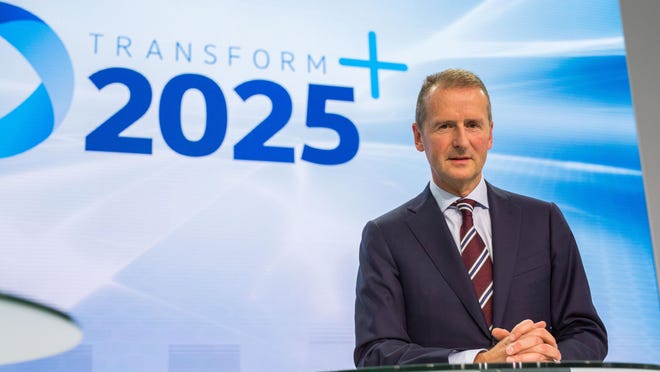Howes: VW eyes using Ford plants in alliance amid trade talks with Trump
 Daniel Howes
Daniel Howes
Under pressure from President Donald Trump, Volkswagen AG is considering an expansion of its U.S. footprint — and it could tap Ford Motor Co. plants to build its vehicles, VW CEO Herbert Diess said after a White House meeting Tuesday.
“We are building an alliance with Ford which will strengthen Ford’s position in Europe because we will share platforms,” he said, according to an account in Reuters. “We might use Ford capacity here in the U.S. to build cars for us.”
It could be a win-win of global proportions. VW would expand its American footprint as a hedge against tariff threats, currency swings and political volatility. Ford could utilize its excess capacity in its U.S. plants, minimizing the risks of any confrontation next September in national contract talks with the United Auto Workers. And the Blue Oval could benefit from added scale in an alliance with Europe's largest automaker.
Ford's executive chairman, Bill Ford Jr., and CEO Jim Hackett, reached at the automaker's annual holiday party, each declined comment on the automaker's VW alliance talks. But company sources familiar with the discussions say agreement is likely to include projects in South America and Europe and a partnership on commercial vehicles.
Likely areas of collaboration include electric vehicles that could be the foundation of a global autonomous-car project with Ford's Argo AI unit as the centerpiece, as well as an effort to free Ford's excess capacity to build VW products that would depend on what products would be included in any partnership.
VW also is "considering building a second car plant" in the United States, perhaps near its sole assembly plant in Chattanooga, Tenn., Diess confirmed, adding: "We are in quite advanced negotiations and dialog with Ford Corporation to really build up a global automotive alliance, which also would strengthen the American automotive industry.”
The public airing of VW's options come as top executives of Germany's Big Three automakers arrived at the White House Tuesday for a "summit" with President Trump and his trade advisers, hopefully to persuade the self-described "Tariff Man" to back away from increasing import tariffs on German vehicles to 25 percent from 2.5 percent.
“When people or countries come in to raid the great wealth of our Nation," Trump tweeted, "I want them to pay for the privilege of doing so. It will always be the best way to max out our economic power. We are right now taking in $billions in Tariffs. MAKE AMERICA RICH AGAIN.”
So this is how this is supposed to work? Germany and the United States do not trade under the kind of bilateral trade relationships favored by Trump and the tariff-happy wing of his administration. They trade within the U.S-European Union trade regime, and the move by Germany's Big Three to separately lobby the administration is controversial back in Berlin.
Handelsblatt, the leading business daily in Germany, reports that policy makers in Berlin and Brussels view the summit as "misguided" and that the EU is "particularly unconvinced" it will prove effective: "EU diplomats say they have made clear to Berlin that the EU regards it as a 'panic action by German manufacturers.'"
Maybe so. But the German Big Three of VW, BMW AG and Daimler AG, parent of Mercedes-Benz, have enormous investments in the United States, depend on U.S. consumers for a sizable chunk of their auto profits, and use their U.S. plants down south to assemble vehicles for sale in other foreign markets, principally China.
The mere threat of 25-percent tariffs on German-made vehicles exported to the United States is enough to drive their separate talks with the administration. Maintaining some semblance of the status quo is vital to their business model.
“We weren’t here as a trade delegation,” Daimler CEO Dieter Zetsche said, according to the Associated Press. “We said in general terms that our planned additional investments here that are not commercially sensible, per se, of course would have to be part of a larger understanding. And for that the conditions under which we operate cannot change. That was very well understood.”
By the Germans, anyway. Amid rising trade tensions, Trump has demonstrated a particular antipathy toward German automakers. In a recent Oval Office meeting, he reportedly answered BMW CEO Harald Krüger's defense of the automaker's production in South Carolina with demands the Munich-based automaker build more in the United States.
Larry Kudlow, director of Trump's National Economic Council, said the administration is interested in talking with German automakers "about a lot of things. I don’t think this meeting or anything else for that matter, right now, is moving toward car tariffs.The president has said it’s in his quiver of arrows, sure, but none of that’s changed.”
Until it does, which could come at the speed of a tweet.
daniel.howes@detroitnews.com
(313) 222-2106
Daniel Howes’ column runs Tuesdays, Thursdays and Fridays. Follow him on Twitter @DanielHowes_TDN, listen to his Saturday podcasts, or catch him 3 and 10 p.m. Thursdays on Michigan Radio’s “Stateside,” 91.7 FM.